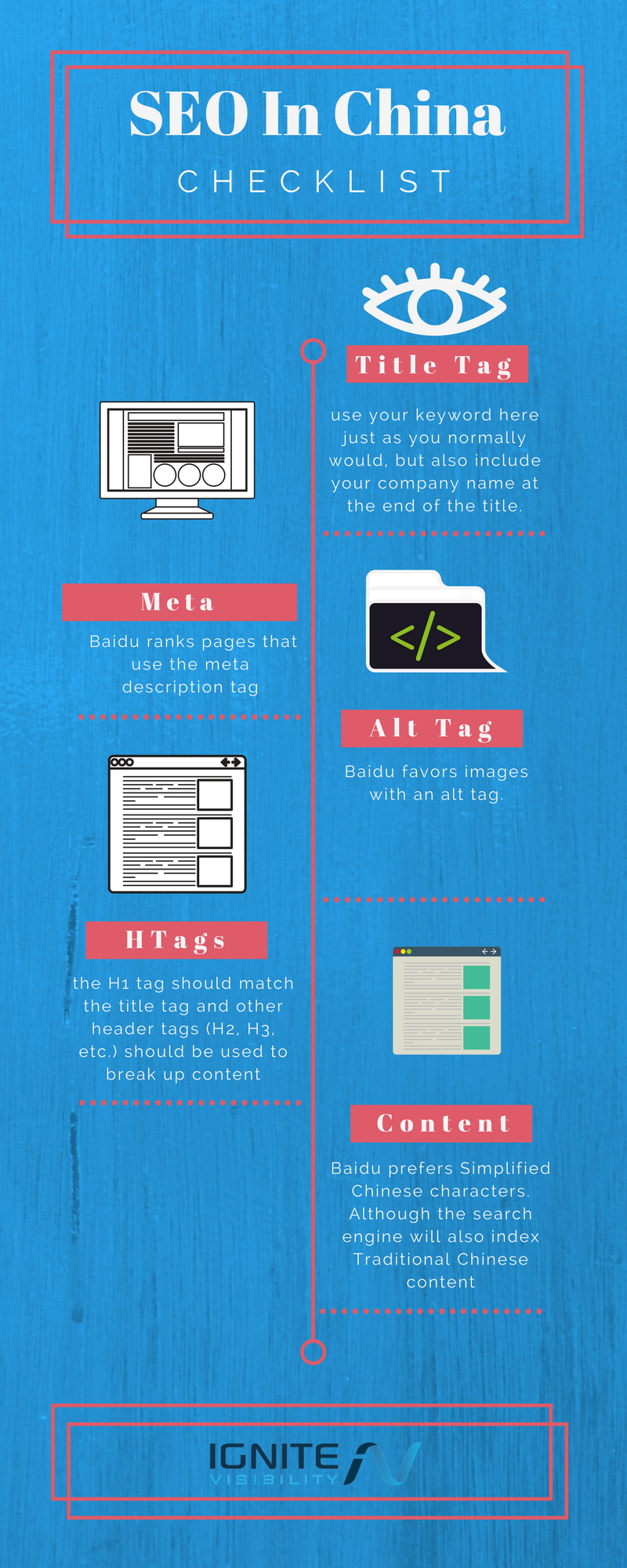Ready to learn how to do SEO in China? This post covers what you need to know to get started.
How would you like to reach an additional billion people with your marketing message? You can do that if you penetrate the great firewall in China.
SEO for a Chinese audience is quite a bit different than SEO for a Western crowd. Although Google is used by some people in China, the most popular search engine over there is Baidu.
Let’s dive into how to do SEO in China.

SEO in China
Baidu commands more than 80% of the market share in China. If you want to reach people in that country, you’re going to need to implement an SEO strategy that involves ranking for that search engine.
Of course, there are other search engines in China as well. Both 360 and Sogou are used by some Chinese people, but they pale in comparison to Baidu.
That’s why it’s best to focus exclusively on Baidu, especially when you’re just starting out with Far East optimization.
Here’s what you can do to ensure that your site ranks well in Baidu.
Grab the Right Domain Name
If you want to make a statement in China, you’ll need the right domain name.
No, that doesn’t mean you have to rebrand. You just need a domain name that’s friendly to Baidu.
That means you need a domain name that ends with .cn (the country code for China). Fortunately, you can just append the .cn suffix to your existing domain name prefix to make that happen.
If you don’t already have your .cn domain name secured, get thee to Namecheap right now and reserve it. It is much less expensive than GoDaddy.
…And Only One Domain
Baidu penalizes sites that use multiple domains. That’s why you should use your top-level .cn domain for everything.
In other words, don’t create a subdomain that’s something like: blog.xyz.cn. Instead, host the blog at the top-level domain (xyz.cn).
Still, you should recognize a www subdomain and redirect it to your top-level domain.
Get the Right Hosting Provider
You probably think that you have a great hosting provider right now. In all likelihood, though, it’s probably not good enough for SEO in China.
You need a Chinese hosting provider, too.
Yes, in addition to getting a Chinese domain name, you also need a hosting provider in that country. That will increase your odds of ranking well on Baidu.
Keep in mind: you can host your site in Hong Kong for this purpose. That might be easier since you might be more likely to find a provider with customer service reps who speak fluent English.
If this whole process sounds like it’s getting expensive, remember that there are a billion people in China. That’s a lot of potential revenue.
Don’t Get Shared Hosting
While we’re on the subject of getting a Chinese hosting provider, you’re going to need to fork over the cash for a dedicated server.
Why? Because the Chinese government is known to crack down (read: censor) sites that it finds offensive. If you’re sharing a server with one or more of those sites, you’re going to get bumped as well.
Get your own server and avoid that headache.
You Need to Have a Physical Chinese Address
Not only do you need a Chinese domain name and hosting provider, but you also need a physical address in China as well.
That doesn’t mean you need to rent office space and open up a branch office overseas, but you should have an agent on Chinese soil who can receive mail addressed to your company.

How to do SEO in China Map
Again, this is because Baidu favors sites with a presence in its home country. If you want to outrank your competitors in Asia, you’ll need to have a Chinese mailing address.
Yes, this is also going to cost money. Keep in mind: a billion people.
Don’t Criticize the Government
Things are a bit different in China. For starters, they don’t have a First Amendment that guarantees freedom of speech.
In fact, China is known to censor sites that criticize the government. If your site gets censored, you can be sure that it will never rank.
So avoid saying anything critical of the government in your content marketing efforts. Keep everything free of politics (which, by the way, is good policy here in the U.S. even though we enjoy freedom of speech).
Get an ICP License
You’ll also need an Internet Content Publishing (ICP) license. That’s a permit issued by the Chinese government that gives you permission to operate a website in China.
However, there’s a caveat here. If you’re not operating in China (and you probably aren’t), you won’t qualify for the ICP license. To get around that, you can partner with a Chinese Internet company to obtain the license.
Speak Their Language
Yes, you will need to produce content using those symbols that you probably can’t decipher. That’s how you’ll rank in Baidu.
Keep in mind, though, that Baidu prefers Simplified Chinese characters. Although the search engine will also index Traditional Chinese content, it’s not preferred.
Baidu won’t index content in Chinese dialects, such as Cantonese. It also won’t index content in any Western language.
So you’re likely going to have to hire some professional help here. Again, get references so you know that your translator is capable of producing content in Simplified Chinese.

How to do SEO in China: Checklist
Go Meta
Once upon a time in Western SEO, webmasters ranked their sites with the use of meta tags. Although those certainly still play an important role, they’re not quite as important as they used to be.
But that’s not the case in China. Baidu absolutely loves meta tags.
Here’s where you can pull a page out of your old SEO playbook. Pay attention to the following tags:
- Title tag – use your keyword here just as you normally would, but also include your company name at the end of the title.
- Meta description – Baidu ranks pages that use the meta description tag higher than those that ignore it.
- Alt tag – Baidu favors images with an alt tag.
- H tags – Follow standard SEO practices here: the H1 tag should match the title tag and other header tags (H2, H3, etc.) should be used to break up content
ABC: Always Be Creating
Baidu likes new content better than old content. That’s why you should follow a solid content marketing strategy that involves always producing fresh content relevant to your niche.
Also, add press releases about your business to your site. That’s a great way to keep the website up to date with great content.
Don’t Be a Copycat
You might think that you can take a shortcut on adding fresh, relevant content to your blog by copying the great work of others. Think again.
Baidu, like Google, hates duplicate content. You simply won’t rank well if you try to game the system by plagiarizing.
Get yourself content that’s not only fresh and relevant, but also original.
Internal Linking
As with any Western SEO effort, your Chinese optimization strategy should include internal linking.
However, keep in mind that Baidu takes notice of the anchor text you use when you link internally. That means your anchor text should match the keyword that’s relevant to the linked resource.
In other words, avoid the often-seen “if you want to learn more, click here” link where “here” is the anchor text. Instead, use an anchor text that includes the keyword.
Be Quick About It
Western SEOs know that site speed is a ranking signal. It’s an especially important ranking signal in China.
That’s why you should browse reviews of Chinese hosting providers before you fork over any cash. Otherwise, you could end up with a Mickey Mouse company that doesn’t deliver the goods when it comes to site speed.
Also, practice good onsite SEO: minify your resources, avoid render-blocking scripts, optimize your images, and eliminate code that isn’t absolutely necessary.
You Have a Toolbox
Like search engines in the West, Baidu has its tool for webmasters. It’s called Baidu Webmaster Tools.
Once you get your site up and running in China, register with Baidu Webmaster Tools to help get your site indexed and ranked.
Keep in mind the tool isn’t as sophisticated as Google Search Console or Bing Webmaster Tools, but it does offer some valuable guidance.
Chinese Keyword Volume
Once again Baidu is the best option for this. You can utilize the Baidu Keyword Planner to find metrics such as search volume, competition, and other tools similar to Google Ads Keyword Planner.
Go Straight to the Top
Keep in mind that Baidu’s crawlers aren’t quite as sophisticated as Google’s. That’s why it’s a great idea to place important keywords near the top of your content.
Don’t Flash Them
There aren’t too many webmasters who still use Flash. But if you were thinking about it, remove that thought from your head right away.
Baidu can’t crawl Flash.
Wrapping It Up How To Do SEO In China
There’s a world of earnings potential on the other side of the Pacific. If you haven’t done so already, why not start marketing your brand overseas with a website that’s optimized for Baidu?
